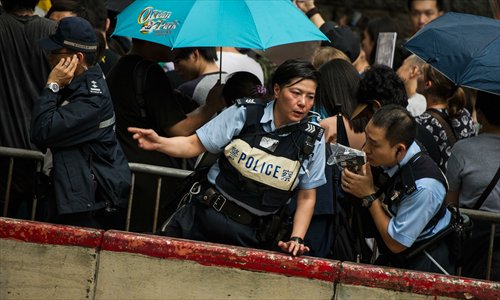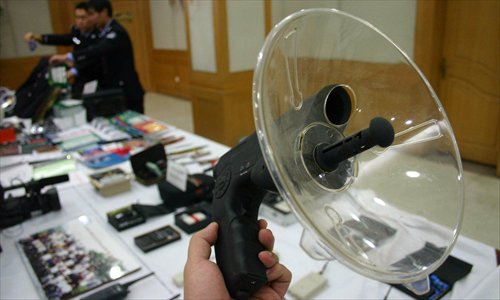HOME >> CHINA
Prying eyes
By Southern Weekly – Global Times Source:Southern Weekly – Global Times Published: 2014-7-23 20:48:21
Hong Kong still hotbed for espionage, corporate and otherwise

Hong Kong Police officers stand guard outside the US Consulate in Hong Kong during a demonstration of support for Edward Snowden, on June 15, 2013. Photo: CFP

Beijing police confiscates spy devices during a crackdown on debt collecting agencies.Photo:IC
The Apliu Stree in Sham Shui Po District, Hong Kong, also nicknamed as "man's street," is a place full of small shops selling electronic devices.
It is also filled with cheap and handy espionage devices.
A shop owner surnamed Mak took out a flash disk and gently toggled the switch beside the disk. "Then it starts recording and nobody would notice," Mak said.
Nearly every shop in the electronic market at Sham Shui Po District sells monitoring equipment like mini-cameras shaped like car keys and magnifiers that can receive sound from far away, the Guangzhou-based Southern Weekly reported. Most of the devices are below $140.
"These are just entry-level equipment," said Mak.
But these equipment have slipped into corners of the city and have created an "eavesdropping culture."
According to the Kroll, a New York-based business data collection services provider, most of the intelligence gathered concerns the stock market and sanitation workers are the group of people hired most to install monitoring devices. It usually takes less than a minute to stick a micro-audio monitor.
The process was depicted in the last month blockbuster Overheard 3, in which business secrets were retrieved through various means and traded between companies. The box-office receipts have topped HK$500 million($64.5 million).
But counters have also emerged in Hong Kong. More international banks and firms would hire people to regularly inspect and clean up unknown electronic devices.
To thoroughly check a room of 200 square feet takes four to five hours and it will take one or two days if telephones, fax machines and computers are also included, an engineering manager of a local company told the Hong Kong-based Standard.
Heaven for spies?
During World War II, Hong Kong, Lisbon and Casablanca were ranked as the top three intelligence hubs. During the Cold War, many spies were based in Hong Kong.
Last year when Edward Snowden, a former NSA technical staff who disclosed the US surveillance program, chose Hong Kong as his place to sojourn for 11 days, many people were reminded of Hong Kong's special position in espionage.
Observers say Hong Kong's unique legal and immigration systems have made the city an ideal hub to collect and exchange sensitive and secret information.
The Hong Kong government has signed visa agreements with more than 100 countries and regions and tens of thousands of people commute between Hong Kong, the mainland and elsewhere. Frequent and large scale population flows have provided good shield for intelligence activities.
There is no specific law against espionage in Hong Kong. As a result, if a permanent Hong Kong resident with UK citizenship is found engaging in spy activities and Hong Kong Special Administrative Region (SAR) government attempts to deport them, there will be a time-consuming lawsuit.
Chow Kam-pui, director of Law and Technology Centre at The University of Hong Kong, told the Weekly that the Hong Kong government, even if it detects abnormal flow of data, has no way to deal with the presences of foreign intelligence.
Normally the SAR government would record the IP or Internet address and then the server will provide personal information of who sent the data.
"Hong Kong government's surveillance of abnormal Internet data flow is severely limited by local privacy laws," Chow said.
Hong Kong police are planning to incorporate cyber security into their current technology divison. But the plan has sparked controversies online as many Net users think it will increase the possibility of the government invading online freedom.
Overseas forces?
Snowden confirmed with the Guardian that a CIA office was located at the US Consulate General in Hong Kong and at least 15 intelligence officers were working there.
He also revealed that US constantly monitors the Hong Kong Internet Exchange and the territory's vital internet exchange point is located at the Chinese University of Hong Kong.
Two Hong Kong newspapers, the Wen Wei Po and Ta Kung Pao published reports in September 2013 claiming that the intelligence activities by UK authorities did not stop after the handover in 1997.
The reports said that British intelligence agents have been installed across the city's government, judiciary, chambers of commerce and the media, headquartered at the local British consulate-general.
The reports were not confirmed by the UK or China authorities.
An employee from the Chinese People's Liberation Army (PLA) Garrison in Hong Kong recalled that many monitoring devices were found at the Prince of Wales Building in Central after it was handed over to the PLA garrison following the handover.
The Wen Wei Po has also claimed the West is formulating a plot to seize power in Hong Kong through the chief executive election in 2017.
Prior to the reports, British Foreign Office minister Hugo Swire published an opinion piece on local media saying that UK has a big economic stake in seeing Hong Kong remain "prosperous, stable and energetic."
Swire said that there are more than 1,000 British enterprises based in Hong Kong, so that the future of Hong Kong matters to the UK.
Recently Hong Kong has seen a wave of protests for "true universal suffrage" in 2017. Many pan-democrats worry there will be political screening of candidates.
A representative with the PLA garrison said that overseas agents did not stop their activities in Hong Kong amid the political instability.
Ye Hailin, an associate professor of Asian studies at the Chinese Academy of Social Sciences, has said that unlike before when Hong Kong was used as a platform to get information on the Chinese mainland, today "foreign forces" would encourage "opposition forces" in Hong Kong to "pin down" the central government.
Posted in: Society, HK/Macao/Taiwan